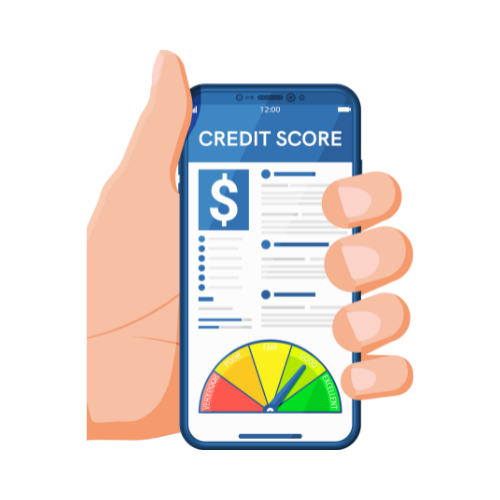Does Credit Affect Your Insurance Rates? Yes, but Why?
Does Credit Affect Your Insurance Rates? In short, the answer is yes. Your credit can affect a lot in your life financially. A high credit score can mean getting approved for a loan with low interest rates. Your credit health can actually affect the amount you pay in premiums whether it be, homeowners insurance, car insurance, or life insurance. Just like lenders, insurance companies want to know how much a gamble they are taking by before accepting new customers.
Usually, they will look at your history to quote appropriate rates. If your score says that you are not always responsible with your other bills, that factor can make you a higher liability to the insurance company.

Studies have even shown that customers with poor credit sometimes pay 91% more in insurance compared to customers with healthy credit. Not every aspect of your credit report is useful for getting a quote. Certain details are compiled and then calculated together into a credit based insurance score. Unfortunately, these scores are not made available to the general public. Some factors could be your payment history, your debt ratio, long credit history, no late payments and low credit usage.
Unlike the lender, an insurer does not consider income, and job history. This all does not mean you will get denied insurance because you have poor credit, but your insurance rates could be high. Let’s explore how your insurance score can affect different types of insurance. The credit score can impact car insurance rates in a large way. A surgery found that a family with poor credit can pay up to $2,090 more to insure just two cars versus a family with great credit.
What’s a good credit score for car insurance?

The impact of credit scores on car insurance rates can vary significantly by insurer and state, as some states have laws limiting the use of credit scores in determining insurance premiums. Generally, insurers consider a range of factors to determine rates, including driving history, age, location, and the type of vehicle, in addition to credit history. Here’s a broad guideline on credit score ranges and their potential impact on car insurance, though specifics can vary:
- Excellent (800-850): Individuals with excellent credit scores often receive the most favorable rates. Insurers view them as low-risk, meaning they are less likely to file claims.
- Very Good (740-799): People in this range also enjoy lower premiums compared to those with lower scores.
- Good (670-739): A good credit score might not net the lowest rates, but premiums should still be reasonable.
- Fair (580-669): Individuals with fair credit scores may see higher premiums, as insurers could view them as somewhat higher risk.
- Poor (300-579): Those in this range are likely to face the highest premiums. Insurers consider them high-risk, partly due to a perceived higher likelihood of filing claims.
Remember, these ranges are general, and the exact impact of a credit score on car insurance rates can vary. Moreover, some states, such as California, Massachusetts, and Hawaii, have restrictions or prohibitions on using credit scores to set car insurance rates. It’s best to check with specific insurers for how your credit score might affect your rates, and also to understand the regulations in your state.
Does Credit Affect Your Insurance Rates? Homeowners Insurance
The specifics of how much your credit score affects your rates can vary significantly between insurance companies and states.
Here are a few key points to consider:
- Credit-Based Insurance Scores: Many insurers use credit-based insurance scores. This is a bit different from your regular credit score, though it is based on your credit report. It helps insurers evaluate your potential risk and calculate premiums accordingly.
- State Regulations: The impact of credit on insurance rates can vary by state. Some states have specific regulations regarding the use of credit information by insurance companies. A few states have even banned or limited the use of credit history in determining insurance rates.
- Factors Considered: Insurers might look at several credit-related factors, including your payment history, the amount of debt you currently have, the length of your credit history, and any new applications for credit.
- Transparency and Rights: You have rights regarding the information used in calculating your insurance score. Insurers are generally required to inform you if your credit information has adversely affected your insurance premiums or coverage options.
- Improving Your Rates: Improving your credit score can lead to lower insurance premiums over time. Regularly checking your credit report for errors and addressing them can also positively affect your rates.
- Exceptions and Discounts: Even with a lower credit score, you might still be able to find competitive rates by shopping around, bundling policies, or taking advantage of discounts for which you are eligible.
Q1: How does credit affect insurance rates?
Credit can impact insurance rates. Insurers may use credit-based insurance scores to assess risk. People with higher scores may qualify for lower rates.
Q2: Can I get insurance with bad credit?
Yes, you can still get insurance with bad credit. However, you may face higher premiums. To discuss your options, call us at 1.888.445.2793.
Q3: How can I improve my credit for better insurance rates?
To improve your credit, pay bills on time, reduce outstanding debt, and review your credit report for errors. Over time, these actions may lead to better insurance rates.
Feel free to ask any of our live agents to give you a quote.
(888) 445-2793
Does Credit Affect Your Insurance Rates? Yes, but there’s more to it that just your credit score. Click Here for more information.
- Gap Insurance Explainedgap insurance Cheat Sheet: 7 Frequently Asked Questions Answered Now! 1. Gap Insurance, What Is It? Gap insurance, also known as Guaranteed Asset Protection insurance, is a type of insurance coverage that helps protect you financially if your car is totaled or stolen and the amount you owe on the car loan is higher than… Read more: Gap Insurance Explained
- Hail damage carHail Damage Car Insurance: Is Hail Covered by My Auto Policy? Ah, hail, those little-iced devil’s that range in size from a pebble to softball with the ability to reduce a beautiful car to a sad dimpled shell of its former glory. If you are lucky, you may get through the storm with just a few… Read more: Hail damage car
- Understanding average cost of a car accidentHere’s What Our Clients Say About Us Cost of a Car Accident: Minimum Limits Average Cost Of A Car Accident: When it comes to auto insurance, understanding what you are protecting now could prevent financial hardships later down the road. Minimum limit policies may save you money on your monthly premiums, but when they are… Read more: Understanding average cost of a car accident
- What documents do you need to keep in your car?Here’s What Our Clients Say About Us Documents to Keep in Your Car: Vehicle Registration Vehicle registration is a critical document that verifies your vehicle is officially registered with your state’s motor vehicle department, confirming you have fulfilled all necessary taxes and fees for your tags/license plates. It is mandatory for your vehicle to be… Read more: What documents do you need to keep in your car?
- Ultimate Guide to Common Insurance Terms [Glossary]Ultimate Insurance Glossary We know…we use a lot of unfamiliar lingo in this industry…but we have you covered! (No pun intended…hehe…) Here is your guide to our commonly used insurance terms: A | B | C | D | E | F | G | H | I | J | K | L | M |… Read more: Ultimate Guide to Common Insurance Terms [Glossary]
INSURANCE SERVICES WE OFFER

Homeowners Insurance
Homeowners, renters, and mobile home owners: make sure you have the protection you need.



